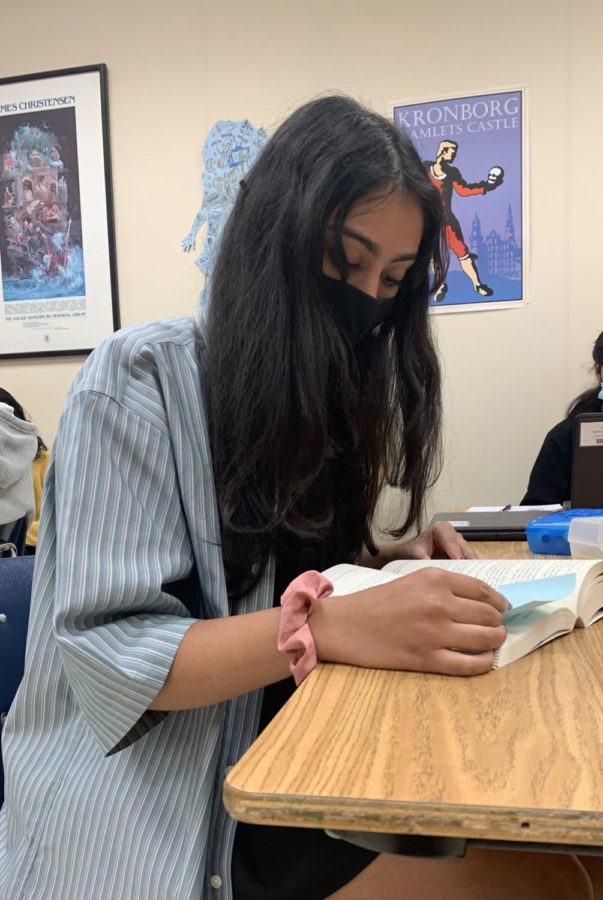LGBTQ+ books removed from libraries
Despite fearing the threat of censorship in the future, senior Mrudula Rapaka reads “The Letter Q: Queer Writers’ Notes to their Younger Selves” on Oct. 21.
November 4, 2021
Concerns over LGBTQ+ young adult novels in school libraries were brought up at a Fairfax County Public Schools (FCPS) board meeting on Sept. 23. Parent Adrienne Hensel voiced a complaint over two books containing mature LGBTQ+ content.
The explicit content in “Gender Queer” by Maia Kobabe and “Lawn Boy” by Jonathon Evinson drove Hensel to protest the use of Fairfax taxpayers’ money in a campaign she said was to normalize homoerotic material among minors. Fairfax High’s LGBTQ+ novel display and queer reading homework, as well as McLean
Library’s “Drag Story Hour,” was also used as evidence of this “campaign.”
After Hensel’s time ended, parent Stacy Langton voiced similar concerns over what she claimed to be pedophilia in “Lawn Boy.” However, the scene Langton mentioned contains no mentions of pedophilia. Instead the book contains a reflection of an adult’s past sexual interactions with another character of a similar age. Langton then read explicit sections of the novels in front of an audience that contained children before her microphone was turned off.
As a result of the complaints, FCPS has decided to suspend the two novels immediately although the decision to keep them is pending further review. However, their decision was controversial to many students and faculty.
Senior Mrudula Rapaka has begun promoting a campaign to promote equal representation in public school libraries. Her passion for the topic has led to her circulating a petition started in Westfield High School for the reinstallment of the novels, which has recently gained attention from FCPS students.
“My issue with the school board’s decision is that it specifically targeted books with LGBTQ+ content,” Rapaka said. “Many of the other novels in school libraries contain mature content as well.”
Although many among the student body agree with her opinion, some consider the downsides to allowing mature content in school libraries at all. Senior Adrian Kim is hesitant about the suitability of explicit content in libraries.
“I do support LGBTQ+ novels in high school libraries, as it increases diversity in sexualities for books, but in my opinion, having mature content is a debatable topic for high school libraries,” Kim said.
According to head librarian Robyn Chung, the removal of these novels was based on protocols in place for situations like these, rather than the consideration of board members or individual school libraries.
“There’s a process [for the removal and censorship of media] for the school and the division,” head librarian Robyn Chung said. “[The complaints about the novels] were moved to a divisional challenge in more than just one or two schools.”
To students like Rapaka, the school board’s immediate response to the complaint about the novels is concerning as it shows the school board maintains a bias against certain literature, in her opinion.
“Although [the school board] must consider every complaint submitted with equal value, I do believe they shouldn’t be supporting behavior that may easily turn homophobic,” Rapaka said. “I find it odd that the school board is only targeting homosexual mature content and ignoring heterosexual mature content. It’s homophobic, that’s just what it is.”




Jaron Josephson • Feb 25, 2022 at 11:04 am
If those photos in the book are too graphic to be shown online, especially by students, then how come is it moral to allow students to have access to hard-copy versions of pornography despite the fact that it is illegal pursuant to § 18.2-376 code of Virginia which the law says:
It shall be unlawful for any person knowingly to prepare, print, publish, or circulate, or cause to be prepared, printed, published or circulated, any notice or advertisement of any obscene item proscribed in § 18.2-373, or of any obscene performance or exhibition proscribed in § 18.2-375, stating or indicating where such obscene item, exhibition, or performance may be purchased, obtained, seen or heard.